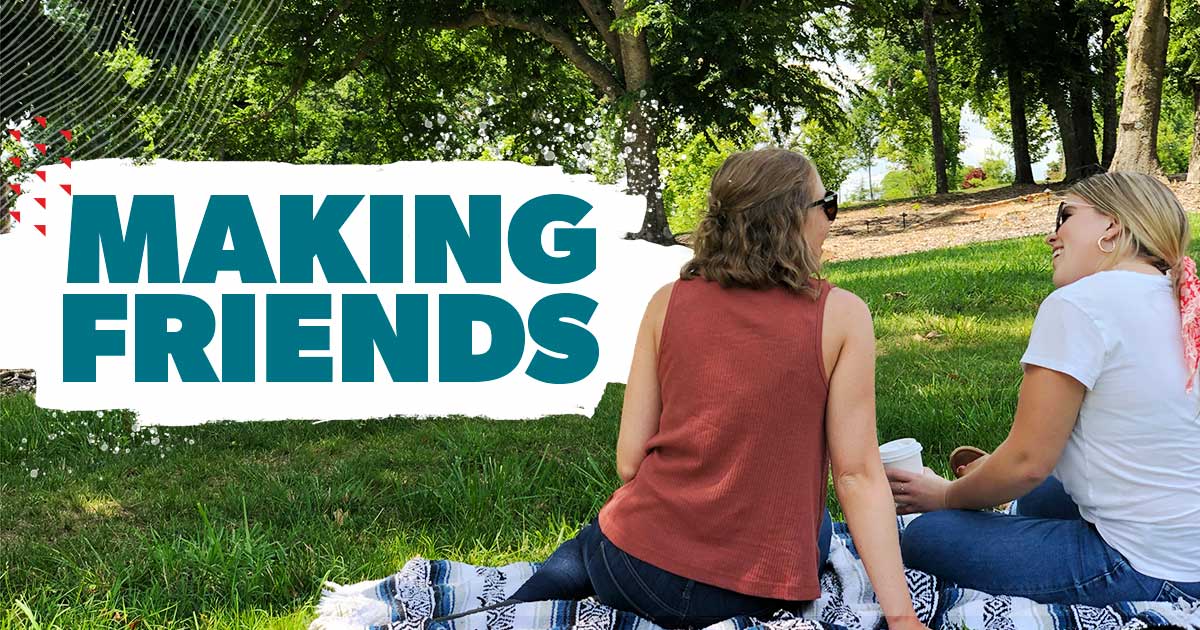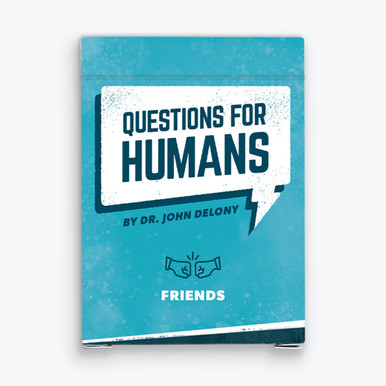
The average American adult hasn’t made a new friend in five years.1 Five years! So, if you’re wondering how to make friends, you’re not alone.
Why is making friends so hard? Because friendships are formed through shared experiences, in doing hard things together, which is why a lot of our ride or die buddies come from childhood or college.
But as we age, we settle into our routines of work and family and errands and isolation. Before you know it, time passes, and you move, change jobs, or have kids. Then one day you look up and realize you’re lonely.
Make no mistake, it is hard to make friends. It’s the worst. It’s awkward and messy, and it takes time. But if you want to live a full life, you’ve got to do it.
Where to Make New Friends
If you’ve ever asked yourself, Why do I struggle to make new friends?, know there’s nothing wrong with you—but you might not be in the right environments to meet new people. Here are 10 places where you can meet new people and make new friends:
- Volunteer in your community.
- Join a local gym or sports league.
- Visit a neighborhood coffee shop or juice bar regularly.
- Join a professional networking group.
- Become a donor or support your community arts, zoo or museum organizations.
- Go to church or join a spiritual study group.
- Take your dog to the dog park.
- Visit neighborhood food, art and music festivals.
- Check out Meetup for local social groups and activity calendars.
- Take a class or learn a new skill through a community college or learning center.
How to Make New Friends
Making new friends as an adult is going to take intentionality. A lot of it. And I don’t care if you’re a 6-foot-2-inch introvert from Texas like me or a social butterfly with a gazillion Instagram “friends.” You’ll need to decide to take action to meet new people. Here are 10 ways to make new friends.
1. Go first and put yourself out there.
All friendships start with risk. When you’re learning how to make friends as an adult, you’ve got to put yourself out there, try to connect, and see how people respond. It’s scary, but it’s worth it. You’ve got to stop waiting for someone else to reach out to you. You go first! You are worth it.
So, at the beginning of this endeavor, decide that you’ll accept awkwardness and rejection. It’s not always going to click or work out, but don’t take any of that personally—just keep showing up. Even if small talk, eye contact, friendliness and smiling aren’t first nature to you, you can learn the skills you need to connect with people and make friends.
By the way, if you’re facing some serious social anxiety or need to work on some basic skills for connecting, I encourage you to find a therapist who can help.
2. Be intentional about staying connected.
We live in a fast-paced, self-centered and isolated world. Making friends is an act of will and a commitment to being open and vulnerable. If you want to make more friends, you have to be purposeful about meeting people, spending time with them, and following up—whatever it takes to stay connected. This means you might need to let go of some habits and time wasters standing between you and friendship. You might need to put reminders on your calendar and practice responding to others. The key is intentionality.
3. Focus on being a good friend.
If you want to have good friends, you must first be a good friend. I’m not just talking about your personality. You don’t need to be the funniest girl in the room or the life of the party guy.
Want to build a non-anxious life? Learn how in Dr. John Delony’s new book.
I’m talking about character and service. Are you kind and respectful? Do you show up pretending to be someone you’re not, or are you comfortable in your own skin? Are you a good listener? Are you generous with your time? Do you show up for people? If you focus on serving others—making them feel seen and known and valued—instead of thinking first about what you can get from them, people will notice.
Questions for Humans: Friends
4. Ask your friends to introduce you to their friends.
This tip for how to get friends is for people who have moved to a new city and are looking for community. You can use your social media network—and your friends who live in other parts of the country—to connect with people in your new city. (This goes for coworkers too.) If you have a friend or acquaintance who wants you to meet someone they like, go for it. Will it be awkward? Possibly. Could it be a disaster? Maybe. But could you also end up with new friends, great connections and a new gang? Absolutely.
5. Invite people over for coffee, dinner or playdates.
Hospitality is a lost art and the foundation of human connection. Unfortunately, our culture loves entertaining, but we’re not good at hosting. Entertaining is about a putting on a performance. It means having swept floors, charcuterie boards and serving platters hand-selected by Joanna Gaines.
Hosting is about making people feel welcome, included and warm. It means an open door, a light on outside, piles of laundry and dishes, and a welcoming spirit. Open up your home and see what happens. Let the neighbor kids come over and play with your kids. Have a weekly “leftover night” where you invite people to bring whatever they have in their fridge and eat around your kitchen table. These simple connections can grow into solid relationships over time.
6. Ask people if they want to be friends (and see what happens).
When my family and I first moved to Nashville, we didn’t know many people. After a few weeks of making connections, we had two different couples over to our house for dinner. After dinner, we sat down and asked them directly, “Will you be our friends?”
Yeah, it was awkward starting over and practicing how to make more friends. But one of the guys we asked had tears in his eyes when he responded, “No one has ever asked me that before.” People crave connection—and sometimes they’re waiting for you to take the first step.
Be generous with your invitations. If there’s a coworker you’d like to get to know, ask them out to lunch or coffee. Buy an extra ticket to a concert and invite someone to come with you. Take your neighbors to church. Or ask someone to go fishing. You don’t know what they’ll say, but it doesn’t matter. You’ve decided to become a person who takes risks. You take care of your side and let the cards fall as they may.
7. Figure out what you like to do—and then do it with other people.
Follow your interests and hobbies and quirks to find like-minded friends. If you love being outside, connect with a hiking group. If you like MMA, host a watch party on fight nights. Whatever your thing is—birdwatching or CrossFit or crime documentaries—find people who are into those same things in your community. My church community is an important place of connection for me and my family. And I love going to concerts, having adventures (see below), and going on hunting and fishing trips.
8. Plan an adventure and invite others to join.
Remember: Friendships form over shared experiences. Nothing will bond you like a wild adventure, whether it’s seeing a show at the theater, attending a live comedy show, taking a day trip to explore a neighboring city, or going on a not-so-thought-through camping venture.
One time, my wife and I asked a couple at church if they’d be interested in taking a vacation together. It was super risky—you’ve got to choose wisely if you’re asking someone to spend that much time with you. But you know what? It went great. That trip helped us connect on a deeper level than we ever had before.
9. Say yes to invitations.
The flip side to taking initiative is being open and available when people ask you to join something. I have a friend named Caitlin who said yes to a lake trip when she had just moved to a city. Honestly, she didn’t want to go. It would have been more comfortable to stay home and eat takeout. But she took a risk and said yes. And she ended up meeting some lifelong friends on that trip, including the man who would become her husband.
I’m not saying if you get invited to a lake, you’ll meet your future spouse. You might go, and it could be terrible. But if you go into it with curiosity, and you keep showing up, you give yourself a chance.
Be adventurous. Sign up for things. Go to parties when you’re invited. Don’t assume it’ll be a disaster or that you won’t get along with those people. Just go.
10. Be patient with the process.
Making friends as an adult can be messy and awesome and frustrating. It might take a while. You might put hours into getting ready for an event, attend the event, and still leave without meeting anyone. That’s okay—and all part of the process. The right relationships will work out. The best relationships take a while to sprout and bloom and grow. Don’t rush! Keep focusing on what you can control and be openhanded with the people you’re given.
What Not to Do When Making New Friends
Now that you’ve got some pointers for how to make new friends, let’s talk about some things not to do when making friends. You’ll avoid some social blunders when you don’t . . .
- Underestimate what you have to offer. You’re a human with interests and questions and thoughts and feelings, and I’m guessing you’re kind because you want to learn how to make friends. What’s not to love? Know the value you bring value to the table.
- Rush or force a connection. Even with the best intentions, making friends takes time. Don’t try to speed up the process or pressure anyone into hanging out with you. Nothing is worse than hanging out with somebody who has an agenda.
- Fake it. There are some people you’ll get along with, and other people who just aren’t a good match. Maybe you’re more Rage Against the Machine and they’re more Taylor Swift. Or maybe you’re both. You can respect each other’s differences without being best friends. The differences are some of my favorite parts of being a friend. And make no mistake: The real you will eventually emerge. So be your glorious self right out of the gate. Stay true to your interests, values and boundaries so you can create healthy friendships. The real you is worth being friends with.
- Be cool. Okay, I know I said don’t force a connection—but don’t hold back, either. If you’re genuinely interested in getting to know someone, let them know. If they’re shy, your friendliness could help them feel at ease!
- Only meet people online. The internet can be a great way to make connections—but those connections shouldn’t stay there. Our bodies, minds and souls need in-person, human connection.
- Think the worst. Like I said—meeting new people can be awkward and messy. But you’re practicing. You’re practicing putting yourself out there, being interested, and opening your heart and home. I’m the worst about sitting at home and spinning myself into a wad of tangled-up fishing line. I get worried about where I’m going, when I’m leaving, who I’m going with, whether I'll enjoy myself, and on and on and on. And this worrying does not help anyone or anything. So simply choose not to. Write down the negative thoughts and then get on with the positive ones. Choose to change your thoughts over time.
Get More Tips on Making (And Keeping) Friends
I’ll keep banging this drum until the day I keel over and die: We need each other. We were created for connection. Try as we might, we cannot do life alone. The good news is that starting a conversation doesn’t have to be tricky! Here are a few things you can do:
Next Steps
- Put yourself in places where potential friends are.
- Be intentional about staying in touch with people and saying yes to invitations.
- Check out my Questions for Humans conversation starters to connect with anyone in a fun, thoughtful way.


